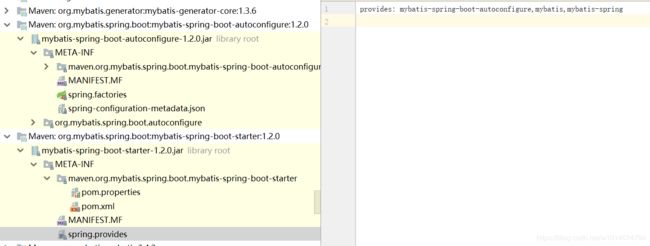SpringBoot——自定义一个spring-boot-starter包
一句话总结:
1、编写自己的properties类(用来加载属性文件进行默认的配置)和核心服务类(要自动配置的bean)
2、自定义AutoConfiguration 配置类CustomerAutoConfiguration ,通过@Condition*系列注解控制自动配置的条件。
3、然后在src/main/resources新建文件夹META-INF,然后新建一个spring.factories文件
在里面使用org.springframework.boot.autoconfigure.EnableAutoConfiguration指定我们自定义的自动配置类的全路径。
这样,一个自定义的spring-boot-start工程就完成了。
命名规则:
这里啰嗦一下,官方对 Starter 包定义的 artifactId 是有要求的,当然也可以不遵守(手动滑稽)。
Spring 官方 Starter 通常命名为 spring-boot-starter-{name}如:spring-boot-starter-web,
比如:spring-cloud-starter-openfeign
Spring 官方建议非官方的 Starter 命名应遵守 {name}-spring-boot-starter 的格式。
比如:mybatis-spring-boot-starter
先简单分析下mybatis-spring-boot-starter的结构:
父包:mybatis-spring-boot 核心功能模块
子包:
mybatis-spring-boot-starter
mybatis-spring-boot-autoconfigure

1、发现mybatis-spring-boot-starter工程本身是个空项目,只通过pom文件和spring.provides说明依赖关系;
其中spring.provides是依赖文件jar包配置的artifactId值
2、在mybatis-spring-boot-autoconfigure工程中发现spring.facoties文件,
内容为:
# Auto Configure
org.springframework.boot.autoconfigure.EnableAutoConfiguration=\
org.mybatis.spring.boot.autoconfigure.MybatisAutoConfiguration
核心代码中只有三个类文件:
1、MybatisAutoConfiguration 自动配置类
2、MybatisProperties 属性文件加载类,通过@EnableConfigurationProperties({MybatisProperties.class})注入到spring容器中,使得在MybatisAutoConfiguration中可以直接注入使用配置属性
3、SpringBootVFS 是类扫描器
打包成jar时,setTypeAliasesPackage(“xxx”)找不到类的问题。MyBatis通过VFS来扫描,
在Spring Boot中由于是嵌套Jar,导致Mybatis默认的VFS实现DefaultVFS无法扫描嵌套Jar中的类,需要改成SpringBootVFS扫描。
通过分析总结一些基础步骤:
本文demo参考mybatis-spring-boot-starter和网上的文章创建自己的start工程。
定义我们自己的spring boot starter工程,通常需要以下4个工程:
- 模块的真正的实现类,如本文的工程为first-spring-boot/-spring的工程:此工程是-spring-boot-autoconfigure和*-spring-boot-starter的父工程类。本例子里是first-spring-boot。
- 此工程的命名规则如下:如果你在这个工程中引入spring依赖,则工程名称为*-spring,如果引入spring-boot依赖,则工程名称为*-spring-boot。
- *-spring-boot-autoconfigure工程:配置自动配置类,本例的名称first-spring-boot-autoconfigure
- *-spring-boot-starter工程:空工程类,在pom.xml中定义需要引入jar,本例的名称first-spring-boot-starter
为了能更好的理解Springboot的自动配置和工作原理,我们今天来手写一个spring-boot-hello-starter。这个过程很简单,代码不多。接下来我们看看怎么开始实践。
1. 新建maven工程。
这块就不演示了,如果不会可以自行百度…啦啦啦,因为太简单了啊
2.新建一个properties类
/**
* @author Lee
* @// TODO 2018/7/25-9:21
* @description
*/
@ConfigurationProperties(prefix = "customer")
public class CustomerProperties {
private static final String DEFAULT_NAME = "Lensen";
private String name = DEFAULT_NAME;
public String getName() {
return name;
}
public void setName(String name) {
this.name = name;
}
}
3.创建一个服务类CustomerService
/**
* @author Lee
* @// TODO 2018/7/25-10:30
* @description
*/
public class CustomerService {
private String name;
public String findCustomer(){
return "The Customer is " + name;
}
public String getName() {
return name;
}
public void setName(String name) {
this.name = name;
}
}
4.AutoConfiguration类
/**
* @author Lee
* @// TODO 2018/7/25-10:32
* @description
*/
@Configuration
@EnableConfigurationProperties(CustomerProperties.class)
@ConditionalOnClass(CustomerService.class)
@ConditionalOnProperty(prefix = "customer", value = "enabled", matchIfMissing = true)
public class CustomerAutoConfiguration {
@Autowired
private CustomerProperties customerProperties;
@Bean
@ConditionalOnMissingBean(CustomerService.class)
public CustomerService customerService() {
CustomerService customerService = new CustomerService();
customerService.setName(customerProperties.getName());
return customerService;
}
}
核心注解说明:
-
@Configuration声明是配置类
-
@EnableConfigurationProperties(CustomerProperties.class)
将被 @ConfigurationProperties修饰的类CustomerProperties加载到spring容器中 -
@ConditionalOnClass(CustomerService.class)
只有在项目路径下加载到CustomerService类,才会进行自动配置 -
@ConditionalOnProperty(prefix = “customer”, value = “enabled”,matchIfMissing = true)
检查配置文件中,是否有以customer开头名称为enabled的配置, 由于允许属性缺失,所以仍然会自动配置。
5. spring.factories配置
在src/main/resources新建文件夹META-INF,然后新建一个spring.factories文件
org.springframework.boot.autoconfigure.EnableAutoConfiguration=
com.developlee.configurer.CustomerAutoConfiguration
pom文件修改artifactId为spring-boot-hello-starter 打包成jar. 然后用mvn install 安装到本地mvn仓库。
-
测试spring-boot-hello-start
com.developlee spring-boot-hello-starter 1.0-SNAPSHOT
新建springboot工程,在pom.xml文件引入安装的jar包
在项目启动类中直接做测试:
@SpringBootApplication
@RestController
public class TestStarterApplication {
@Autowired
CustomerService customerService;
@GetMapping("/")
public String index(){
return customerService.getName();
}
public static void main(String[] args) {
SpringApplication.run(TestStarterApplication.class, args);
}
}
application.properties文件配置下我们的customer.name
customer.name = BigBBrother
接下来启动项目,请求地址localhost:8080,即可看到页面上显示BigBBrother。
到这我们已经完成了一个spring-boot-starter jar包的开发,有很多功能我们可以自己封装成一个jar,以后要用直接引用就行了~ 这样写代码是不是会有不一样的体验呢?

